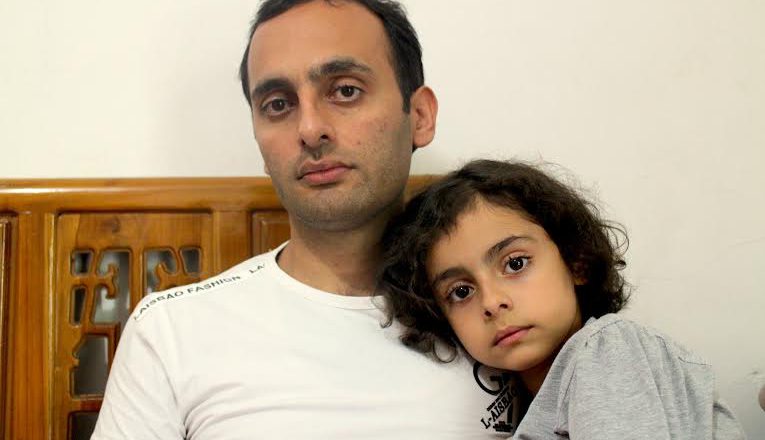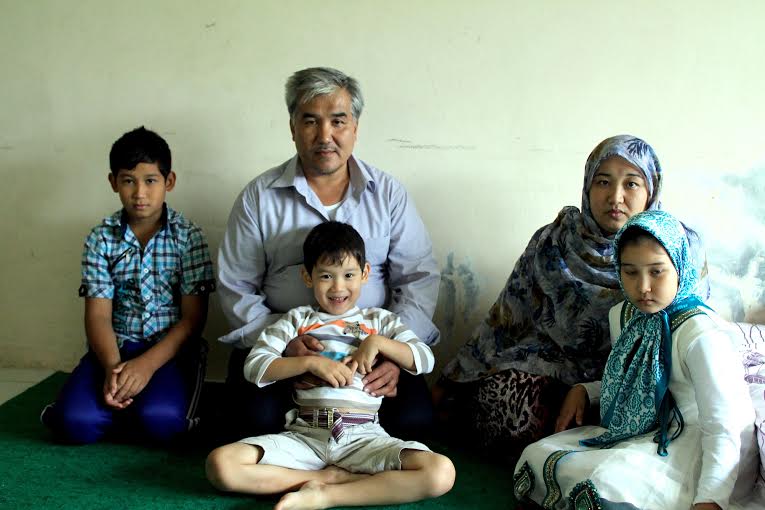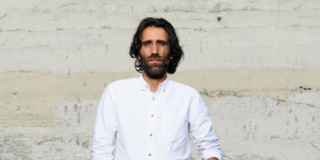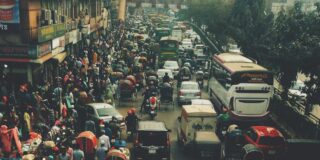
By Laura O’Neill.
It’s 2.30pm and the sky has turned from a clear blue to a heavy dark grey, feeling like dusk in the middle of the day. Javanese shop owners pull market stalls under shelter, a sea of umbrellas pop open, while local kids laugh and splash in the puddles. The rain has started for the next few hours as it does each day in the hill town of Cisarua, approximately two hours south of Jakarta, Indonesia. While life comes to a kind of standstill during the rainfall, at least the heat is not as oppressive as the still and polluted air in Jakarta for the hundreds of refugees and asylum seekers who etch out a life in limbo here. While circumstances are difficult and hope is slim, at least the mountain air provides some ethereal relief for those displaced and homesick.
To set the scene, the area of Bogor has traditionally been a drawcard for asylum seekers arriving to Indonesia with the intention of finding a people smuggler to take them to “The Christmas”. Over the years, rich Arab tourists have been travelling to the region as a tourist destination (not always with the best intentions in cases of seeking child brides and sex tourism). Middle Eastern businesses established a few home comforts including imported foods and some sense of cultural and language community which attracted asylum settlements.
Up until a few months ago, through the funding of the Australian government, the International Organization for Migration (IOM) was also supporting a large number of approved refugees through providing housing compounds. Due to space constraints in the region, hundreds of people have now been transferred to Jakarta, Surabaya and Medan. This unfortunately meant that by-product services, including an informal school for refugee children, have also disappeared. It is impossible to ever know how many refugees and asylum seekers reside here in Bogor, but estimates are at about one thousand people. Asylum seeker hubs, approved refugee settlements and Immigration Detention Centres are scattered throughout the archipelago in cities such as Yogyakarta, Medan, Jakarta, Kupang, Lombok, Tanjung Pinang, Makassar, Surabaya, Medan, Denpasar and Pontiank. As of mid 2013, UNHCR figures suggest there are 10,340 persons of concern residing in Indonesia, however if you also consider refugees originating from Indonesia and those from abroad who do not register their existence in Indonesia, a more likely statistic could be running into the tens of thousands.
Since the combined intentions of both Rudd and Abbott to “deter” the boats and create a “no advantage” situation, people here in Indonesia have heard the message and seen the posters. Now, more than ever, they feel completely trapped. By now, a few months into the new policy change, people are able to make informed decisions about whether or not they will risk their lives to reach Australia by boat. So while boat arrival numbers have seemingly dropped somewhat and Abbott zips his lips about statistics, people on the ground here are not generally planning to go by boat these days as the season makes the seas incredibly dangerous and rough. They are in limbo. In the past, asylum seekers have told me Australia had threatened that all irregular maritime arrivals will be sent offshore, however under Gillard many people ended up living on bridging visas in the community. So right now there is a small seed of hope among asylum seekers that the current policy may not be completely implemented in the future or may even change.

Mohammad with Family (Laura O’Neill)
Back in Bogor, Mohammad Ishaq sits in his one room rented home in a shared asylum seeker building with his wife and three children. At eleven and nine years old, the two older children stare blankly without smiling and exhibit an unworldly emptiness completely incongruent with the experience of youth. As Hazara Afghans, the children have experienced a life of terror, war and discrimination; they rightly have not had too much to smile about in their short lives. In both an eerie and refreshing contrast, their five-year-old brother giggles, smiles and runs around plucking imaginary games from thin air. This provides everyone a sense of warmth and comfort from his innocence while simultaneously generating deep worry and sadness to contemplate what sort of future awaits for the child.
Every parent sacrifices their lives for their children and as illiterate adults, Mohammad and his wife’s compelling concern is to find an education for their children. All day the children sit in their room and as each day passes, Mohammad’s sadness grows deeper knowing his children are wasting their time. Five years before arriving in Indonesia, as ethnic Hazaras, Mohammad’s family fled Afghanistan in fear of their lives and sought asylum in Syria. They applied to the UNHCR and were granted refugee status, receiving simple support including a housing allowance and informal schooling for the children while waiting in a foreign land and hoping for resettlement. As terror once again reigned in this family’s life and horrors unfolded in Syria, life became unendurable and Mohammad’s family fled to Indonesia.
Although the family were recognised as refugees in Syria, when they went to the UNHCR office in Jakarta they were told they would have to restart the entire Refugee Status Determination process from the beginning. The family are classified as asylum seekers, not refugees, meaning no support, protection, work rights, access to education or healthcare. For the present moment, providing simple meals and paying the $A50 per month rent is a daily concern eating away at Mohammad’s mind, on top of the heavy traumas from the past. Despite all of this suffering, Mohammad still exhibits grace, warmth, gratitude and an irrefutable shine from his calm, hospitable eyes.
Life is tough, unfair and heartbreaking for this family as it is for each refugee and asylum seeker. However, life becomes even more desperate for those that have been rejected as refugees. From Iran, Mehrnaz and her two daughters have been in Indonesia for over two years. They saw friends and others “go by boat”, but decided they did not want to risk their lives and have been waiting in Bogor while applying in the legendary “queue” that naive people think exists in places like Indonesia.
After their first rejection, worry enveloped Mehrnaz’s family and by the time the second and final rejection was passed down they were told that within 15 days Indonesian immigration officers would come to their home and collect them to take Mehrnaz, her teenage daughter and five-year-old daughter indefinitely to Immigration Detention. In their neighbourhood in Bogor, 11 families from different backgrounds (Iran, Afghanistan and Iraq) have also been told the same fete. The entire compound permeates worry as everyone faces impossible choices. So knowing this fate, knowing how dangerous the boat journey is, knowing that Nauru or PNG awaits, what are they to do? Mehrnaz doesn’t want to go by boat but has lost all hope in Indonesia and says they can’t go back to Iran. So at least under Australian support offshore, surely life has got to be better than an Indonesian detention centre for an unknown period of time. It is not a decision between a rock and a hard place, rather the choice of Hell One or Hell Two for the miserable life of an asylum seeker.
In the same compound of “rejected families” is 37-year-old Mehdi Javid Kian and his wife, 28-year-old Elahe Davood Abadi, along with their seven-year-old daughter Asal (Honey) Javid Kian who have now been rejected twice by UNHCR. Javid is an atheist who has spoken openly about his beliefs and is now in grave fear for his life. In a recent interview with an Australian journalist, Javid spoke severely against Islam in response to an extreme YouTube video graphically showing Muslim extremists cutting the head off a Christian man in Syria. Javid also showed me this film clip which was unbearable to watch and evoked deep disbelief and raw emotions at the extremist attitudes and actions. He has also criticised the rules, law and constitution of the Islamic Republic of Iran and due to this, was forced to flee his homeland with his family, arriving in Indonesia three years ago.
Like all asylum seekers looking for protection, Javid went to the UNHCR office to apply for refugee status. As his claim for asylum is related to his religious opinions, Javid believes that he did not have a fair process as his Indonesian Muslim case officer judged his atheism and told him that “I know you are Muslim as you were born in Iran”. Most asylum seekers wait 100 days for the result of their first interview, but Javid waited 18 months to find out his claims were rejected. His case is now closed and IOM informed him and his family that they would be collected by Indonesian Immigration to be deported or imprisoned. To escape this fate, Javid’s feels his family is forced to wait in hiding however, without any identity documents, the family is living in a risky situation. He is also deeply worried that other Muslim families will attack him due to his opinions. His stress, worry and trauma are clear, yet it amazes me that during this pressing precariousness, he welcomes me to his home with kindness, compassion and peace.
The stories unravel as does a prevalent community grief in every home, street and corner of this town. For those who are religious, faith brings some relief by uniting the community together in a peaceful and welcoming Mosque. During the Shia Muslim 10 day Mourning of Muharram, men, women and children gather together and offer their grief at the death of the Prophet Mohamad’s grandson, Hussein ibn Ali. Between the four walls of the small mosque, tissues are passed around and the sounds of wailing and chest sobs fill the candle lit night air. The act is a traditional custom to offer commemoration and sorrow for Hussein, but looking at the level of grief expressed, this tradition seems to release so much more.
With no work rights, no ability to send their children to school and lengthy Refugee Status Determination waiting periods without guarantee, life in Indonesia can never be a viable resettlement solution. If Australia genuinely wants to “stop the boats” then what is Australia doing about the alternatives for those waiting in Indonesia? By definition, the conditions of a “queue” include an orderly, fair and systematic process, however as people have told me, UNHCR lacks transparency and communication; the Refugee Status Determination process is much more like a loop-de-loop zigzagging serpent with human lives waiting at the end of the trail.
Refugees and asylum seekers waiting in limbo in Indonesia desperately need help and assistance. Their previous lives have been full of immense trauma and hardship and life in Indonesia continues to be stressful without protection, support or hope for the future. As a modern, developed and democratic country supposedly commitment to human rights, Australia needs to support neighbouring Indonesia to deal with the influx of asylum seekers and refugees who ultimately seek protection from Australia.
As the current government wants to “Stop the Boats”, the government really needs to “Start the Protection”, beginning with improving regional processing. Did you know that as an asylum seeker in Indonesia wanting to contact the UNHCR, there is only a tiny window of public communication available between 2pm to 5pm on Fridays only? This short three hour time frame is for all the thousands of people needing to talk to the office from all over Indonesia. Email communication is also in vain; I had not met one person who received a response from their email communication and in fact I met one family who camped on the street outside the office for four days and still did not hear from staff members. How can this be acceptable?
It is the waiting and not knowing that erodes people’s spirits. Without clear transparency, some people from the same village with very similar problems wait three to 12 months to receive their first interview. Without explanations as to why this is the case, asylum seekers become increasingly despondent and more and more desperate every day. Compounded with nothing to do, no source of income and the heartbreak of watching young children miss out on an education, life for refugees and asylum seekers in Indonesia is undoubtably miserable. Australia needs to know about these people and can not sweep human lives under a carpet of “not my problem”. It is our problem because we are all humans. The day Australia signed the Universal Declaration of Human Rights was the day we committed ourselves to honouring Article 14: everyone deserves the right to seek and to enjoy in other countries asylum from persecution.
All photographs and stories have been published with the willing permission of refugees and asylum seekers who hope that by showing their plight, more people will understand, share compassion and advocate change for their incredibly difficult circumstances.
Laura O’Neill holds a Masters in Development Studies. She has worked with asylum seekers in Nauru, Christmas Island, Darwin, Sydney, India, Malaysia, Indonesia and Nepal.




